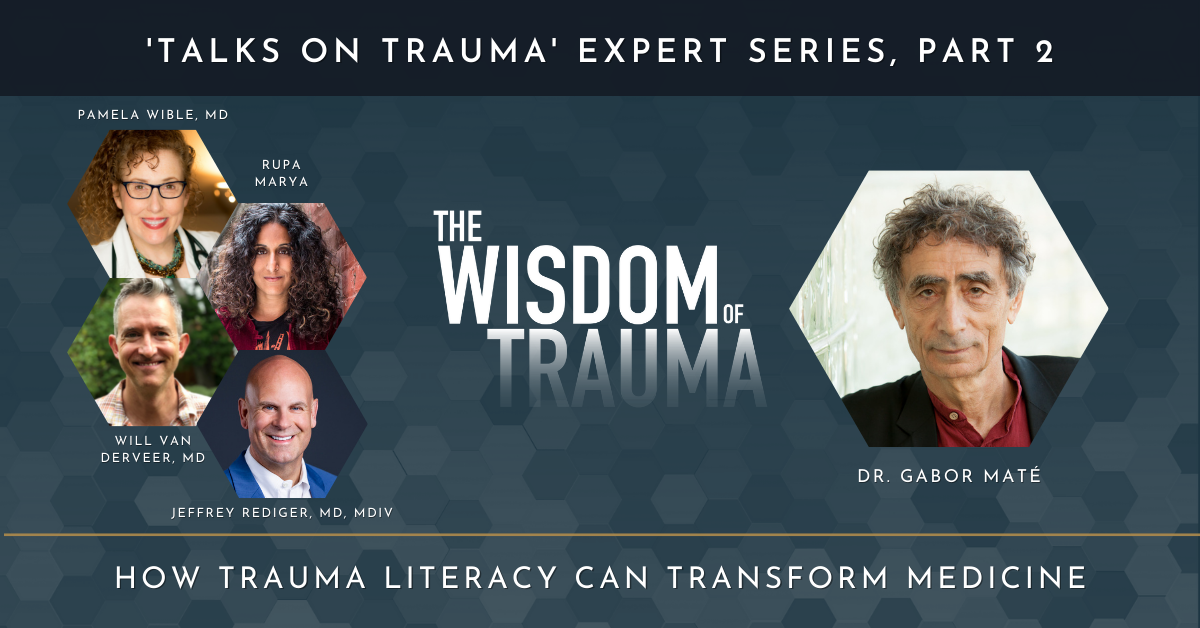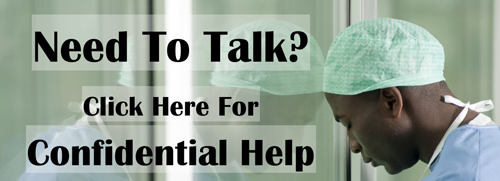Today I was honored to be a participant in a stellar physician panel of international leaders in the field of trauma with Gabor Maté, M.D., Rupa Marya, M.D., Will Van Derveer, M.D., and Jeffrey Rediger, M.D., M.Div.
View 5-minute clip above on healing physician trauma then view entire talk here.
We explore how traumatized medical students become traumatized doctors emotionally ill-equipped to succeed as healers —and how trauma literacy can transform medicine. We also discuss how social conditions built along lines of inequality and power traumatize people and lead to illness and how we can heal from “incurable” illnesses by connecting with the authentic self.
Register here to view the trauma talks and The Wisdom of Trauma film—now viewed over 4,000,000 times worldwide.
Trauma is the invisible force that shapes the way we live, the way we love and the way we make sense of the world. It is the root of our deepest wounds. Dr. Maté gives us a new vision: a trauma-informed society in which parents, teachers, physicians, policy-makers and legal personnel are not concerned with fixing behaviors, making diagnoses, suppressing symptoms and judging, but seeking instead to understand the sources from which troubling behaviors and diseases spring in the wounded human soul.
View The Wisdom of Trauma film trailer
This is an important film that brings greater awareness to the effects of trauma in our world and to the need for a trauma-informed society. In the film, you will see how different people access the wisdom of their trauma so that it becomes a teacher. Trauma can help us learn more about ourselves, our relationships, and the world that we live in.
















Thank you for your thought, which I asiduolous absorb.
It seem to me, after a lifetime in healthcare, that patients require assurance that the direction in which they are being pushed, is a consensus view, and hence the need for a “team agreement” (of which eye contact is only part of the “honesty” approach.
This need for “consuls” is enhanced by a “team approach”. For that reason the nurse has an important role(I ( I. am an orthopaedic surgeon))
It is of great concern to me that there is a dearth of (true) nurses, which I believe could change health care “back”.
I have written suggestions for attracting nurses back into health-care elsewhere; should you be interested, please write back.
Totally agree we need compassionate and skilled nurses and others on the team especially in hospital-based environments (lung transplants, ortho surgeries, etc), In outpatient primary care and psychiatry sometimes what people need is less staff and admins and more time in the old-fashion solo-solo practice with just the doc. I’ve LOVED working this was for last 16 years. My fav cousin is an RN and it is tough to find people like her as she retires. Definitely have a shortage of health professionals for the needs of our communities.
This discussion was so illuminating! Thank you Dr. Wible for your great commitment to teaching other physicians about trauma-informed care and ideal clinics. As someone who felt lost in the medical system for 13 years, I agree that patients simply want to be heard. The basic question, “what is stressful in your life right now?” can reveal the true cause of symptoms, which are always rooted in our emotional landscape. True listening is medicine.
IT IS NECESSARY TO HEAL THE SOCIETY. INDIVIDUAL AND LOCAL TREATMENTS WILL BE TEMPORARY SOLUTIONS.
TEACHING IN SCHOOLS? CHILDHOOD PROBLEMS AND ADULT AND GERIATRIC PROBLEMS:YOUR VALUABLE AND SENSITIVE GROUP TRYING TO CORRECT PHYSICIAN SUICIDES MUST CHALLENGE HEALTH CARE ECONOMICS AND THE GOVERNMENT THAT MAKES THE HEALTH CARE ECONOMICS AND SOCIAL ECONOMIC VERY COMPLICATED.
ASK THE MEDICAL STUDENT WHY S/HE WANT TO BE A MEDICAL DOCTOR.I AM A MEDICAL SCHOOL GRADUATE AND HAVE THE “MD” TITLE AT THE END OF MY NAME,AND I NEVER PRACTICE MEDICINE. I EVALUATED HE PRACTITIONERS’ PERFORMANCE AND KNOWLEDGE. I BELIEVE THAT MEDICAL EDUCATION/TRAINING AND CONTINUING EDUCATION MUST BE CHANGED.INTERNS MUST SPEND A SEMESTER A HOME HEALTH AIDES. DOCTORS MAKE HOME VISITS DEPENDING ON THE SITUATION INSTEAD OF TAKING PATIENTS TO CLINICS/OFFICE ON GURNEYS / WHEELCHAIRS.DOCTORS AND MEDICAL STUDENTS MUST LEAR TINY BIT SOCIOLOGY AND ECONOMICS AND VERY WELL FORENSIC MEDICINE ENFORCED WITH THE STATE AND FEDERAL MEDICAL LAW.Physician suicides are a socio-political problem. Countries and cultures must be compared along with the crimes committed by the physicians.
SUICIDE IS AN INDIVIDUAL RIGHT, WHICH COULD BE USED CORRECTLY OR WRONGLY. I AM WAITING FOR PHYSICIAN ASSISTED SUICIDE WITHOUT ANY FANFARE AS A PATIENT, WHO IS AWARE OF THE SHORTCOMINGS OF MEDICAL WORKERS (MD, RN, …), I AM HOPING NYS WILL MAKE “THIS MERCY KILLING (PRIEST WOULD PERFORM)”AN ITEM IN THE NYS HEALTH LAW.